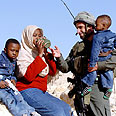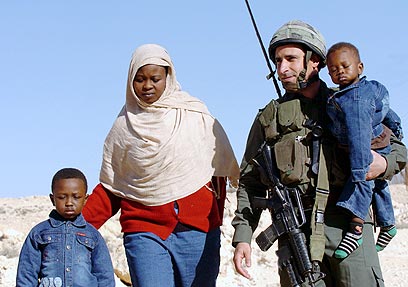
Sudanese refugee: I just want to live here
There are no good guys or bad guys in the story of 250 refugees who escaped from Darfur, snuck into Israel in hope of finding refuge, and were imprisoned through no fault of their own
M. snuck into Israel in the hope of finding political asylum, just like dozens of other refugees from Darfur, where genocide has been taking place for the past three years. Like the others, M. has been imprisoned since he was caught crossing the border with Egypt, first in Ketziot Prison, and later in Ma’asiyahu Prison.
“All I want to do is to get out of prison and live here in peace. I can’t return to Darfur, but I also can’t stay in prison my whole life, and I’m afraid of rotting here,” says M.
“It’s like a detention camp, they give us food and that’s all. They don’t talk to us, but we are human beings just like them. Not animals. I’m not asking for favors, just to work in Israel and to live with security. Nothing is waiting for me in the Sudan besides death. I hope that the country will make a humanitarian gesture and release us.”
M’s modest longing for a normal life that does not include death, so understandable to all of us, is shared by over 250 Sudanese refugees in Israel, most of them imprisoned through no fault of their own in Ketziot Prison, and 47 in Ma’asiyahu Prison.
The government of Israel has not yet decided how to deal with the refugees, claiming they constitute a “security threat” and that if they are granted political asylum many others will follow in their wake. The cries of those imprisoned in Ma’asiyahu, who last Monday started a hunger strike to protest their imprisonment, has not yet changed official policy.
The “Committee for Darfur Refugees” has submitted a request to the High Court of Justice to provide the prisoners a hearing to determine if there is a need for their continued incarceration.
“A country faithful to the values of the basic right to life, to bodily integrity, and to freedom, does not throw survivors of genocide and refugees from a bloody civil war, who have escaped in order to find political asylum within that country, into prison under difficult circumstances for an unlimited period of time just because they are the citizens of a certain country,” wrote the plaintiffs’ representatives, Attorney Anat Ben-Dor of the Refugee Rights Program at Tel Aviv University and Attorney Yonatan Berman of the Hotline for Migrant Workers.
The petition was submitted a week ago. The state’s representatives have not yet responded.
Maybe I was lucky to be taken away?
M. has trouble recounting the story of how he reached Israel by a circuitous route, and describes in a few words the many tortures he went through. “I’m sorry that it’s hard for me to speak a lot about what happened to me in Darfur,” he says. “I still fear that in the end I’ll be deported back there.
“I had a family in Darfur, parents, four brothers, and two sisters. Three and a half years ago the Janjaweed militias began to run amuck, to murder, to rape, and to pillage entire villages. One day when I was working in the field near my village, the militia came and took me to a detention center. The security personnel interrogated me, asking a lot of questions. I have no idea why or what they thought I had done.
"They beat and tortured me every day for over a month. Later they decided to release me on condition that I sign a declaration not to ever talk about what they had done to me, and not to leave the area. I returned to my village, which was almost completely burned down, and I didn’t find a soul. I was told that anyone who wasn’t killed had fled. I didn’t find my parents or my brothers or sisters. Maybe I was actually lucky that they took me away?
“During my searches I found a friend, I told him what had happened to me and asked him to help me escape to Khartoum, about 370 miles away. I managed to get to Khartoum and to get a passport, and from there I escaped to Egypt. When I reached Egypt I went to the UN agency and I told them my story, they gave me temporary authorization and asked me to return for an interview in six months. I came back and I was told to come back in another half a year.

Sudanese refugees in the Egyptian border (Photo: Meir Azulay)
“When I was released from prison in Egypt I decided not to wait any longer for the UN agency. A friend told me about Israel and said that perhaps here I'd manage to find asylum. Luckily he gave me a bit of money and I was able to pay the guides for the journey. I crossed the border on foot, and the moment I crossed the Israeli army arrested me. I’ve been in prison since then.”
'We of all people must be humane'
A small group of activists including those associated with the Hotline for Migrant Workers has been trying to regularize the Darfur refugees’ status in Israel.
According to Hotline Director Sigal Rosen, “There are moshavim and kibbutzim that have agreed to serve as an alternative to detention for groups of refugees. They have a place to go; the state is the one leaving them in prison after their exhausting and harrowing journey. They do not constitute a security threat.
“The refugees imprisoned in Ketziot are in two wings,” says Rosen. “In one of the wings they sleep outside in tents in the wind, the dust, and the cold desert night. They do not go to work, and they have no money from any source or any way to contact the outside world. In the other wing the conditions are better and they sleep in their cells.
"The prisoners in this wing are allowed to go to work in cleaning or digging ditches, and they receive NIS 80 a month in wages. I must mention that their treatment by the prison guards is positive; the prisoners’ difficult problems result mainly from the lack of a budget.
“One of the refugees has already been imprisoned for half a year since escaping from Egypt. His wife, who is going to give birth any day now, stayed behind after he miraculously managed to rescue her from Darfur, together with his two-year old son. He has no way of locating them and knowing what is happening to her and his older son.
"Other refugees have told us about abuse and violence by Egyptian citizens, not just by the regime, including beatings and the use of clubs and knives. The refugees were persecuted there because of Egypt’s shaky economic situation, and this is the main thing causing them to try to come to Israel.”
“Over two million human beings have perished in Darfur, and the world once again remains silent,” wrote Noah Flug, Chairman of the Center of Organizations of Holocaust Survivors, to Internal Security Minister Avi Dichter.
“The Jewish people, which learned firsthand the lesson of the Holocaust in Europe, has a moral obligation to cry out and to act. We of all people must be humane to refugees, to the persecuted who are fleeing areas in which genocide is taking place. The morality of the Jewish people and its past cannot allow a refugee in Israel to sit behind bars through no fault of his own.”










